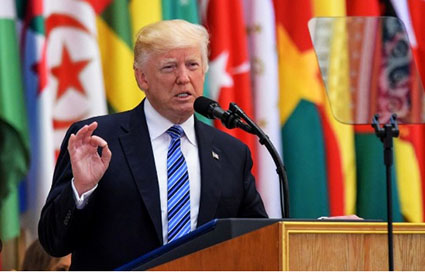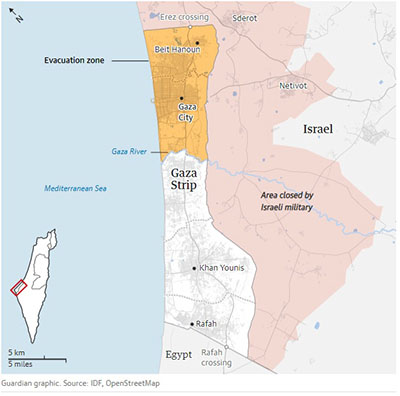by WorldTribune Staff, October 13, 2023
Terrorism is back, and its brutal and bloody manifestation on Oct. 7, 2023 in Israel was days later on Oct. 13 not only being tolerated but celebrated in the Middle East, world capitals and even on U.S. Ivy League campuses. What happened?
Years before the “Day of Jihad”, President Donald Trump, in an address at the Arab Islamic American Summit in Riyadh, Saudi Arabia on May 21, 2017, called on Middle East leaders to join his administration in seeking to eradicate organized terrorism.
Trump said: “There can be no coexistence with this violence. There can be no tolerating it, no accepting it, no excusing it, and no ignoring it. Every time a terrorist murders an innocent person, and falsely invokes the name of God, it should be an insult to every person of faith. Terrorists do not worship God, they worship death.”

Lost in the fog of war as Hamas jihadists slaughtered more than 1,300 Israelis and Israel’s vow to respond by eliminating the Gaza-based terror organization, is, what would the Middle East look like if Trump were still president?
Trump wrote in a Truth Social post: “There was no better friend or ally of Israel than President Donald J. Trump. Under my leadership, the United States stood in complete solidarity with Israel, and as a result, Israel was safe, America was safe, and for the first time in decades, we made historic strides for Peace in the Middle East. As an example, all of the experts said that the Abraham Accords couldn’t be done, but we got them done, and were able to set the Middle East in a new and positive direction.
“Crooked Joe Biden’s weakness and incompetence has empowered and emboldened our enemies all over the World, and now, many lives have been so needlessly lost. What a horrible failure Biden has been in sending 6 Billion Dollars to Iran, in a simple hostage swap, when Iran is the state sponsor of terrorist groups, Hamas, Hizbullah, and others. Biden’s massive loosening of sanctions allowed 80 to 100 Billion Dollars of Iranian oil sales — much of which the regime poured into financing its bloody campaigns of terror around the globe. When I was President, and exclusively because of me, Iran was BROKE, and wanting to make a deal. No wonder the World is in absolute chaos! With President Trump back in office, Israel, and everyone else, will be SAFE AGAIN!”
Analysts say a primary goal of Hamas and its Iranian backers is to derail normalization of ties between Israel and Arab nations that began with Trump’s Abraham Accords which has been cautiously continued by the Biden team.
“Hamas launched its attack as Saudi Arabia appeared to move closer to establishing formal diplomatic ties with Israel, which would reshape the region’s political landscape,” Guy Taylor wrote in an Oct. 12 analysis for The Washington Times. “It remains to be seen whether Hamas achieved that goal, given the Saudis’ long historical role as a protector of Palestinian rights and popular Arab support of the Palestinians.”
“The buzz before this calamity was talk of a possible Saudi-Israel normalization deal,” said Brian Katulis, vice president of policy at the Middle East Institute.
“The efforts to advance a more proactive diplomatic approach, including a possible Saudi-Israeli normalization deal, will be placed on the back-burner as the Biden team engages in crisis diplomacy and steps up security support to partners across the region,” Katulis wrote in an analysis for the think tank.
The Abraham Accords, named after the prophet recognized by Judaism, Christianity, and Islam, resulted in normalization agreements between Israel and the United Arab Emirates, Bahrain, Morocco, and Sudan. It was Arab nations’ first official acknowledgment of Israel’s sovereignty since Egypt in 1979 and Jordan in 1994 broke from the rest of the Middle East to establish diplomatic ties with the Jewish State.
The extent to which the Israel-Hamas war has derailed the Abraham Accords is unclear.
Amir Hayek, Israeli ambassador to the United Arab Emirates, told Reuters that he believes the Abraham Accords are “very strong” and expressed gratitude toward the UAE for issuing a statement categorizing the Hamas attack as a “grave escalation.”
Morocco is facing internal pressure from protests of retaliatory Israeli airstrikes that have killed more than 1,700 Palestinians in Gaza. Sudan has moved this week to restore diplomatic relations with Iran.
“Despite the appearance of Israeli-Saudi momentum last month, Saudi Arabia and Iran formally restored diplomatic ties in April in a deal brokered by China. It was a notable step toward reconciliation after years of regional rivalry and acrimony over a war between the Saudi military and Iran-backed rebels in Yemen,” Taylor wrote.
Iranian President Ebrahim Raisi and Saudi Crown Prince Mohammed bin Salman spoke by phone for 45 minutes this week, for the first time since April, Iranian state media reported on Thursday.
According to Al Jazeera, a top Raisi adviser said on social media that the two “discussed the need to end war crimes against Palestine,” stressed “Islamic unity” and agreed that the “[Israeli] regime’s crimes and the U.S. greenlight will cause destructive insecurity for the regime and backers.”
Israel on Thursday called for the relocation of more than 1 million civilians to the southern part of the Gaza Strip ahead of an expected ground offensive.
 Hamas called on Palestinians not to evacuate, telling residents in the north of the territory to “remain steadfast in your homes and to stand firm in the face of this disgusting psychological war waged by the occupation”.
Hamas called on Palestinians not to evacuate, telling residents in the north of the territory to “remain steadfast in your homes and to stand firm in the face of this disgusting psychological war waged by the occupation”.
The United Nations and humanitarian groups asked Israel to reconsider its request.
Dozens of Israeli jets hit 750 military targets overnight in the northern Gaza Strip, the Israel Defense Forces said.
The Israeli military said on Friday that it entered the Gaza Strip to conduct raids targeting Hamas militants and as part of an effort to locate Israeli hostages.
More than 1,300 Israelis have died since the Hamas terror campaign began on Oct. 7. Gaza officials say more than 1,790 Palestinians have died in Gaza. The death toll of U.S. citizens has risen to 27, while 14 remain unaccounted for.
A new Rasmussen Reports poll found American voters overwhelmingly support Israel in its reaction to the Hamas attacks.
Respondents in the poll supported the call for the “complete eradication of Hamas in Gaza” by a 3-to-1 margin, 66% to 19%. That included the majority of every group tested by Rasmussen.
By an even larger margin, likely voters tested by Rasmussen blamed the Palestinians for the war, 53% to 10%. Another 24% blame both sides. And that included all groups in the survey blaming the Palestinians.
The results were less clear when voters were asked if America was doing enough for Israel. Joe Biden has dispatched weapons and military support to Israel, and both the secretary of defense and the secretary of state have made stops this week in Tel Aviv.
Asked about U.S. support for Israel, 38% in the poll said it was about right, 33% said the administration hasn’t been supportive enough, and 17% said Biden has been too supportive.
U.S. Defense Secretary Lloyd Austin said the U.S. was ready to send “additional assets” as he met with Israeli Prime Minister Benjamin Netanyahu and other top officials in Tel Aviv on Friday. The U.S. is sending munitions and weaponry into Israel.
Even though Israel has long maintained that it goes to great lengths to avoid civilian casualties, Austin nonetheless warned the Israeli military against taking “revenge” in the Gaza Strip.
“Terrorists like Hamas deliberately target civilians, but democracies don’t,” Austin said during a visit to Israel on Friday. “This is a time for resolve and not revenge, for purpose and not panic.”
Austin declined to say if the U.S. would take pre-emptive action against the Lebanon-based Hizbullah terror organization amid speculation that the U.S. could enter the conflict.
“I will just tell you clearly that the United States will continue to support Israel’s right to defend itself,” Austin told journalists at the Ministry of Defense in Tel Aviv, standing beside Yoav Gallant, the Israeli defense minister. “The message we would send to any country or group thinking to take advantage of this situation and widen the conflict: don’t,” Austin said.
Please Support Real Journalism
Hello! . . . . Intelligence . . . . Publish
